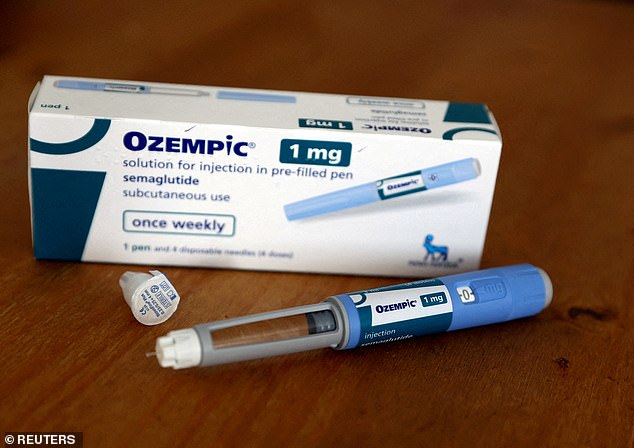They have been touted as a panacea for weight loss, but doctors warn that millions of patients do not lose fat while taking weight loss drugs like Ozempic.
Obesity experts have warned that about 20 percent of patients do not respond well to medications.
About 31 million Americans have ever taken weight-loss medications, which means millions of people are “non-responders” and not seeing the intended benefits.
Experts say this is especially concerning given how expensive the drugs are (more than $800 for a monthly supply without insurance) and the fact that many people need to take them for life to avoid regaining lost weight.
Still, the Biden administration announced plans this week to expand Medicare and Medicaid coverage to include these drugs.
Ozempic, Wegovy and Mounjaro are injectable GLP-1 receptor agonists and work by mimicking a hormone in the body that controls the rate at which food is processed in the intestine, slowing this process. This reduces appetite and helps people eat less.
In clinical trials, most people taking obesity medications lost an average of 15 to 22 percent of their body weight.
However, recent research suggests that non-responders fall far short of the average loss, losing only five percent of their body weight.

Other people struggle to lose weight using drugs. Comedian Tracy Morgan said that despite initial changes in appetite, he “ate more than Ozempic and gained 40 pounds while taking the drug.”
Scientists aren’t sure what exactly happens in non-responders, but they believe it has to do with the body’s unique biology.
Dr. Fatima Cody Stanford, an obesity expert at Massachusetts General Hospital, said Associated Press Obesity varies dramatically from patient to patient, and doctors warn that people should not expect the same dramatic results as some of their favorite celebrities.
Obesity is influenced by genetics, hormones, and the way a person’s brain functions and regulates body processes.
Dr Stanford saying: ‘It’s about explaining that different people have different answers. This is a disease that comes from the brain. The dysfunction may not be the same (from one patient to another).’
Underlying conditions can also affect how a person responds to these medications, Dr. Gitanjali Srivastava, an obesity specialist at Vanderbilt University, previously told Dailymail.com.
Dr Srivastava said: “Often these patients have very complicated conditions.
“There are a lot of factors going on, including probably very strong genetics at play.”
This includes common complications such as polycystic ovary syndrome (PCOS) and hypothyroidism, two conditions that affect weight gain, with an estimated 5 million and 29 million Americans, respectively.
Comic Tracy Morgan56-year-old, shared in the spring of 2024 that he “overcame” Ozempic and, in fact, he gained 40 pounds while taking the drug.
And James Corden said: “I tried Ozempic, and it won’t surprise you, when you look at me now, that it didn’t really work.”

James Corden admitted to using Ozempic but said it “didn’t really work”
She continued: “I tried it for a while and then I realized I was like, ‘Oh no, nothing about the way I eat has to do with being hungry.’
‘The only thing it does is make you not feel hungry. But I rarely eat (just because I’m hungry).’
Kandi Buress also said she tried Ozempic last year but didn’t lose weight.
She said at PageSix’s Virtual Reali-Tea. podcast: ‘My doctor told me, “I don’t know what the problem is. I don’t see this in other people.”
‘It didn’t stop my appetite. I know some people say, ‘Oh, I can’t eat.’ Not me. I was eating appetizers, a normal meal and a dessert, okay? That didn’t stop anything for me.’
And many social media users shared similar stories, with one person saying they gained 13 pounds while taking weight-loss medication.
TikTok user Shelly said the medication wasn’t working for her, so she increased to the highest dose for five months, but still saw no results.
Even people who initially respond increasingly report that when they stop taking the medication they regain their weight.

Of the many GLP-1 medications that have come to market, Wegovy and Zepound have been designed specifically for weight loss. Ozempic, Mounjaro and Trulicity were originally designed to treat diabetes, but are sometimes prescribed by doctors to treat patients without authorization.
An April 2022 study found that when some people stop the drug, they regain two-thirds of their original body weight.
Additionally, side effects such as nausea, vomiting, diarrhea, and depression lead users to discontinue the medications.
Then, there are rarer and more serious conditions.
About one in 100 GLP-1 users develops a condition called gastroparesis (paralysis of the stomach). This can cause stomach pain, vomiting, nausea, bloating, constipation, and loss of appetite.
Over time, a buildup of stomach contents can cause severe dehydration, malnutrition and blockages in the digestive tract, according to Yale School of Medicine.
If someone begins to show signs of this condition, their doctor may recommend that they gradually reduce the GLP-1 medication.
If someone has a bad response to one of these medications but still wants to try using them, doctors sometimes prescribe a different brand.
Some of them contain different active ingredients and others have different dosages or side effects.
So while the drugs show promise for large numbers of people, there is growing evidence to show that they are not necessarily a panacea.


